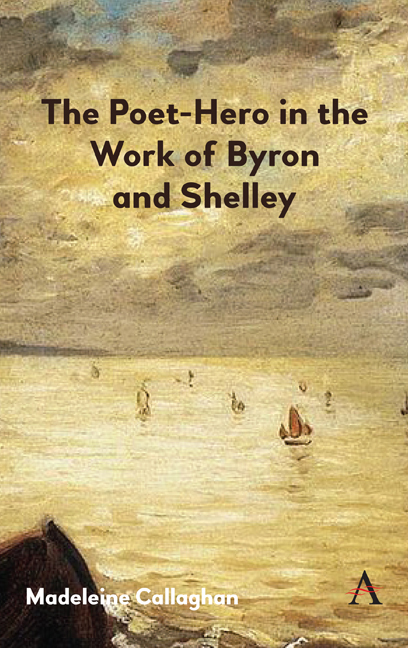Book contents
- Frontmatter
- Dedication
- Contents
- Acknowledgements
- Note on Texts and Abbreviations
- Introduction: The Poet-Hero: ‘Who shall trace the void?’
- Part I Byron
- Interchapter
- Chapter Five ‘As we wish our souls to be’: Julian and Maddalo and The Island
- Part II Shelley
- Conclusion The Byronic and the Shelleyan Poet-Hero
- Bibliography
- Index
Chapter Five - ‘As we wish our souls to be’: Julian and Maddalo and The Island
from Interchapter
Published online by Cambridge University Press: 30 March 2019
- Frontmatter
- Dedication
- Contents
- Acknowledgements
- Note on Texts and Abbreviations
- Introduction: The Poet-Hero: ‘Who shall trace the void?’
- Part I Byron
- Interchapter
- Chapter Five ‘As we wish our souls to be’: Julian and Maddalo and The Island
- Part II Shelley
- Conclusion The Byronic and the Shelleyan Poet-Hero
- Bibliography
- Index
Summary
The Byron-Shelley relationship has been the focus of much academic scrutiny. Critics have drawn out the dialogue between the two poets to reveal its significance for some of Byron and Shelley's most successful works. William D. Brewer points up the nuanced nature of the pair's intellectual engagement, while Charles E. Robinson emphasizes the literary conversation that took place between the two poets, and Michael O'Neill's magisterial close reading of Byron and Shelley's poetry takes in the vital differences between them even as he shows how both are united in making and unmaking ‘poetic identities’ that are, above all, ‘forged in the work’. Yet both poets turn critic as they consider the significance of themselves and of their friend and rival. If ‘Shelley admired much of Byron's other poetry, and seems to have imagined a proprietorial relationship with some of it’, Byron was also aware of Shelley's achievements, praising his personality with ‘surely he has talent – honour – but is crazy against religion and morality’, and his poem Laon and Cythna with ‘His Islam had much poetry’ (BLJ 6: 174) to R. B. Hoppner despite his fear of being painted as in league with his younger peer. Their works explore the possibilities and limitations of poetry, the ends and aims of poetic heroism, and how the role of the poet can be understood. But Julian and Maddalo and The Island are not celebrations of finished versions of the poet-hero. Making both poems carefully personal as well as studiedly impersonal, they record their own failure, and the failure of one another, to claim the role of the poet-hero. Shelley's Julian and Maddalo and Byron's The Island reveal the way in which both poets conceptualized and understood their self-created literary identities where neither poet earns nor claims the right to be the poet-hero. Recreating themselves and one another as actors in an imagined world, poetic heroism is aspired towards but never achieved by the poetic character that each had shaped in their own poetry.
- Type
- Chapter
- Information
- The Poet-Hero in the Work of Byron and Shelley , pp. 105 - 122Publisher: Anthem PressPrint publication year: 2019

